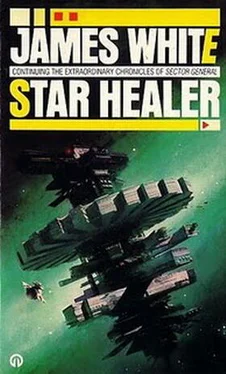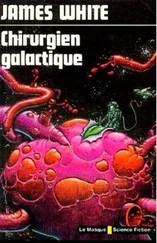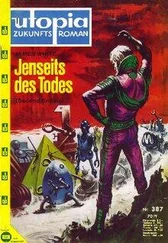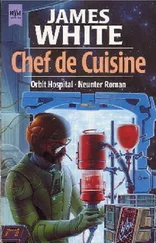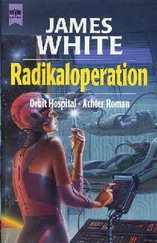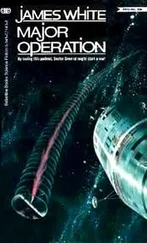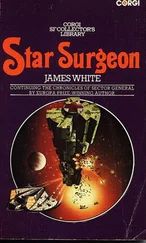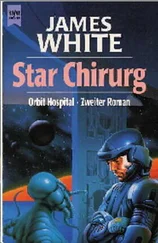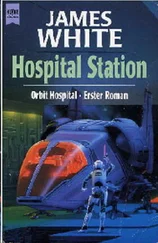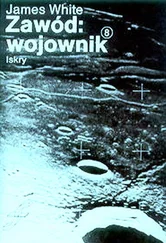This time, he thought, the patient is paying attention.
“Your life-mate donated its undamaged limbs and one lobe of its nutrient absorption organ to the patient you can see at the other side of the ward,” Conway went on. “That patient, like you, will continue to live in a state of perfect physical health, except for some irksome restrictions regarding environment and own-species group activities. And in addition to its protecting you and your unborn child during the accident, you are both continuing to live because one of your hearts was also donated by your life-mate.”
“While its presence is gone from you except as a memory, Conway added quietly, “it would not be completely true to say that it had died.”
He watched closely to see how Forty-three was taking this blatantly emotional onslaught, but the tegument of the body was too hard and featureless to give any indication of its feelings.
“It tried very hard to keep you alive,” he went on, “and so I think you owe it to your life-mate’s memory to continue trying very hard to stay alive, although there will be times when this will not be easy.
And now for the bad news, Conway thought.
Gently, he went on to describe the effects of knocking out the FROB immune system-the aseptic environment which the patient would require, the specially prepared and treated food, and the barrier nursing and isolation ward procedures needed to guard against the possibility of any FROB infection invading the body which had been rendered utterly defenseless. Even the infant would have to be removed from the parent immediately after birth. Only visual contact with it would be possible, because the child would be normal in all respects and would therefore be a health hazard to the defenseless parent.
Conway knew that the child would be raised and well cared for on Hudlar-the FROB family and social structures were both highly complex and flexible, and the concept of “orphan” was completely unknown to them. The infant would be deprived of nothing.
“If you yourself were to return to your home world,” Conway said in a firmer tone, “the same protective measures would be necessary to keep you alive, and at home your friends would not have the facilities and experience possessed by this hospital. You would be confined to your own quarters, you would have no physical contact with another Hudlar, and the normal range of exercise and work activities would be forbidden. There would also be the constant worry that your protective envelope would be breached or your nutrient infected and, with no natural defense against disease, you would die.”
The native Hudlars were not yet medically advanced enough to maintain such a sophisticated facility, so its death would be certain.
The patient had been watching him steadily while he was speaking. Suddenly its membrane began to vibrate in reply.
“In the situation you describe,” it said, “I might not worry too much about dying.”
Conway’s first inclination was to remind Forty-three of all the work that had gone into keeping it alive, the implication being that it was displaying a lack of gratitude. But the Hudlar component of his mind was making comparisons with the normal FROB life-style and that which Conway was offering it. From the patient’s viewpoint he might not have done it a favor, other than by saving the life of its child-to-be. Conway sighed.
“There is an alternative,” he said, trying to put some enthusiasm into his tone. “There is a way in which you could lead an active working life, without physical constraints on your movements. In fact, you could travel all over the Federation, return to asteroid mining if you like, or do anything else you have a mind to do so far as your working life is concerned, provided that you do not return to Hudlar.”
The patient’s membrane vibrated briefly, but the translator was silent. Probably it was a sound of surprise.
Conway had to spend the next few minutes explaining the basic tenets of multispecies medicine to the patient, and how disease and infection was transmissible only among the members of a species with a common evolutionary history and environment. An Ian or a Melfan or a member of any other species would be quite safe with an Earth-human with the most contagious and virulent Earthly diseases, because the victim’s pathogens were ineffective against-in fact they would completely ignore and be ignored by-the tissues of any other off-planet species. An ailment could, therefore, only be contracted from a being’s own world or people.
“You can see what this means,” Conway went on quickly. “After your wounds are healed and the child is born, you will be discharged from the hospital. But instead of confining you to an aseptic prison on your home world and severely restricting your activities, you could elect to go to another planet, where your lack of resistance to Hudlar diseases would be unimportant, because the pathogens on that world would have no interest in you.
“Your nutrient would be synthesized locally and would not be a source of infection,” he continued. “However, immunity suppressant medication will be required periodically to ensure that your immune system does not restart and begin to reject your artificial organs. This will be administered by a medic from the nearest Monitor Corps office, which will be given full instructions regarding your case. The Corps medic will also warn you of impending visits by members of your own species. When this happens you must not go anywhere near them. Do not occupy the same building as they do or, if possible, even the same town.”
Unlike the transplant patients of many other species, who could accept donor organs with no rejection problems after a short time on suppressants, the Hudlar immune system had to be permanently neutralized. But this was not the time, Conway thought, to add another misfortune to the list.
“Exchanges of news between you and your friends at home should be by communicator only,” Conway went on. “I must stress this point. A visitor of your own species, or even a package sent from home, would harbor the only kind of pathogens capable of infecting and killing you, and they would do so very quickly.”
Conway paused to allow the full meaning of his words to sink
in. The patient continued to regard him for a long time, its membrane showing no indication of it wanting to speak. This was a Hudlar in full female mode, and its present major concern would be for the safe delivery and future health and happiness of its offspring.
When the birth was successfully accomplished, as it would be, the deceased male-mode life-mate should have been present to take care of the child and to slip gradually into female mode. Because of the death of its partner, that function would be taken over by close relatives. Immediately following the birth, however, this patient would begin the inevitable changeover to full male mode, and in that condition the absence of its life-mate would be particularly distressing.
People of many intelligent species had lost life-mates before now. They had learned to live with it or they had gone out and found another who would accept them. The trouble here was that FROB-Forty-three would not be able to make physical contact with any other member of its species, and would therefore remain in full male mode for the remainder of its life. That, for a young adult Hudlar, would be an intensely frustrating and unhappy condition to be in.
Through the torrent of sex-related Hudlar material which was flooding his mind, a purely Earth-human thought rose to the surface. What would it be like to be forever separated from Murchison and every other member of his species? If he could have Murchison he would not mind having only a bunch of extraterrestrials to talk to and work with-that was the everyday situation at Sector General. But to be cut off from the one form of warm, human, intimate, and mentally as well as physically stimulating contact which he had been taking for granted for so many years-he did not know what he would be able to do about that. The question was unanswerable because the situation was unthinkable.
Читать дальше
